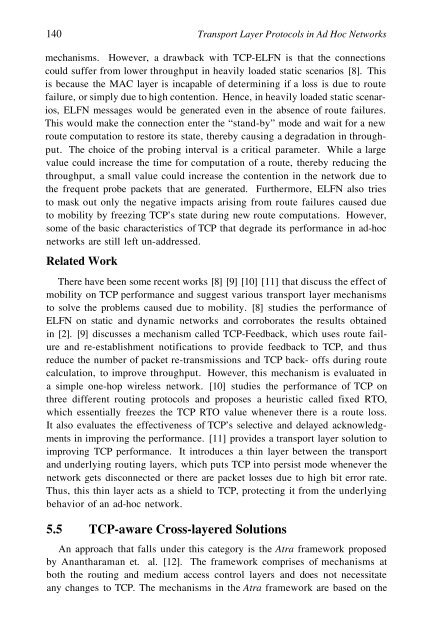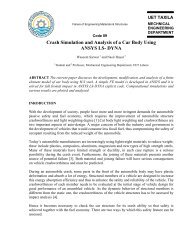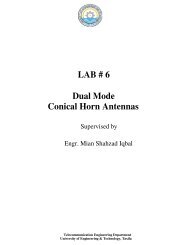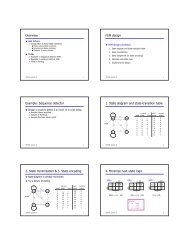Ad Hoc Networks : Technologies and Protocols - University of ...
Ad Hoc Networks : Technologies and Protocols - University of ...
Ad Hoc Networks : Technologies and Protocols - University of ...
You also want an ePaper? Increase the reach of your titles
YUMPU automatically turns print PDFs into web optimized ePapers that Google loves.
140 Transport Layer <strong>Protocols</strong> in <strong>Ad</strong> <strong>Hoc</strong> <strong>Networks</strong><br />
mechanisms. However, a drawback with TCP-ELFN is that the connections<br />
could suffer from lower throughput in heavily loaded static scenarios [8]. This<br />
is because the MAC layer is incapable <strong>of</strong> determining if a loss is due to route<br />
failure, or simply due to high contention. Hence, in heavily loaded static scenarios,<br />
ELFN messages would be generated even in the absence <strong>of</strong> route failures.<br />
This would make the connection enter the “st<strong>and</strong>-by” mode <strong>and</strong> wait for a new<br />
route computation to restore its state, thereby causing a degradation in throughput.<br />
The choice <strong>of</strong> the probing interval is a critical parameter. While a large<br />
value could increase the time for computation <strong>of</strong> a route, thereby reducing the<br />
throughput, a small value could increase the contention in the network due to<br />
the frequent probe packets that are generated. Furthermore, ELFN also tries<br />
to mask out only the negative impacts arising from route failures caused due<br />
to mobility by freezing TCP’s state during new route computations. However,<br />
some <strong>of</strong> the basic characteristics <strong>of</strong> TCP that degrade its performance in ad-hoc<br />
networks are still left un-addressed.<br />
Related Work<br />
There have been some recent works [8] [9] [10] [11] that discuss the effect <strong>of</strong><br />
mobility on TCP performance <strong>and</strong> suggest various transport layer mechanisms<br />
to solve the problems caused due to mobility. [8] studies the performance <strong>of</strong><br />
ELFN on static <strong>and</strong> dynamic networks <strong>and</strong> corroborates the results obtained<br />
in [2]. [9] discusses a mechanism called TCP-Feedback, which uses route failure<br />
<strong>and</strong> re-establishment notifications to provide feedback to TCP, <strong>and</strong> thus<br />
reduce the number <strong>of</strong> packet re-transmissions <strong>and</strong> TCP back- <strong>of</strong>fs during route<br />
calculation, to improve throughput. However, this mechanism is evaluated in<br />
a simple one-hop wireless network. [10] studies the performance <strong>of</strong> TCP on<br />
three different routing protocols <strong>and</strong> proposes a heuristic called fixed RTO,<br />
which essentially freezes the TCP RTO value whenever there is a route loss.<br />
It also evaluates the effectiveness <strong>of</strong> TCP’s selective <strong>and</strong> delayed acknowledgments<br />
in improving the performance. [11] provides a transport layer solution to<br />
improving TCP performance. It introduces a thin layer between the transport<br />
<strong>and</strong> underlying routing layers, which puts TCP into persist mode whenever the<br />
network gets disconnected or there are packet losses due to high bit error rate.<br />
Thus, this thin layer acts as a shield to TCP, protecting it from the underlying<br />
behavior <strong>of</strong> an ad-hoc network.<br />
5.5 TCP-aware Cross-layered Solutions<br />
An approach that falls under this category is the Atra framework proposed<br />
by Anantharaman et. al. [12]. The framework comprises <strong>of</strong> mechanisms at<br />
both the routing <strong>and</strong> medium access control layers <strong>and</strong> does not necessitate<br />
any changes to TCP. The mechanisms in the Atra framework are based on the

















